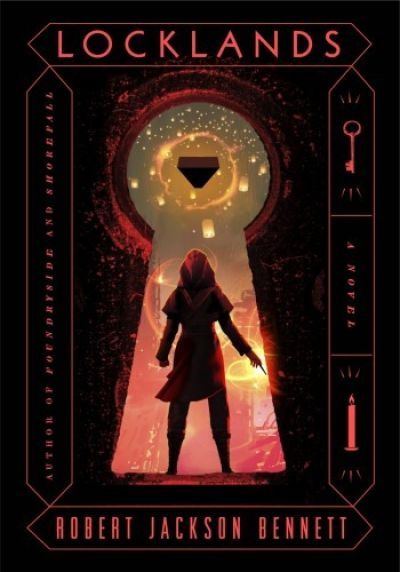Big Girls Don’t Cry
Locklands (Founders, volume 3)
By Robert Jackson Bennett

26 Oct, 2023
2022’s Locklands is the third and final volume in Robert Jackson Bennett’s Founders Trilogy.
Thief turned revolutionary Sancia Grado, girlfriend Berenice, and her friend Clef have triumphed over the merchant house of Tevanne!
Also their actions facilitated the rise to power of something predatory, inhuman, inhumane, and expansionist, compared to which the merchants were but a minor threat. Having doomed the world to worse than slavery, Sancia and company search for a way to undo their new foe.
The new foe is to a great extent their fault. It has been enabled by a magical technique they invented in a previous volume, a technique that links minds together. Result: the entity once known as Valeria and is now the composite entity Tevanne can slave her subjects’ minds to hers. The process is easy to start and hard to resist. If one were to send an army against Tevanne, one would soon find one’s own forces ensorcelled and turned against one.
Not everything the revolutionaries created is awful. The same basic technique that Tevanne uses for tyranny is used in a very different manner by Giva, a community of revolutionaries. Mind links are voluntary; the connections are two-way rather than one-way. The result is a community whose members are keenly aware of each other. The founding of Giva would be a tremendous step forward, were it not for the fact that Tevanne presents a seemingly unstoppable existential threat.
The only reason the very heavily armed Tevanne has not yet crushed Giva is because a large part of the city’s attention is focused on Crasedes the hierophant. Ancient, powerful, and knowledgeable, Crasedes was the very threat that inspired our heroes to accidentally facilitate the rise of Tevanne. Now Crasedes is the lesser of two evils.
Tevanne appears on the verge of learning crucial information about the nature of reality. Armed with this, Tevanne will be able to break reality so badly that the universe’s creator(s) will have to notice and repair their flawed world. There but two catches to this bold plan: everyone within reality will die, and there’s no guarantee that the entities whose attention Tevanne hopes to catch do in fact exist.
What can save the universe? Why, a daring heist, aimed at the heart of the enemy territory!
~oOo~
This volume is fairly hefty. It’s also a surprisingly fast read. I allocated a large chunk of time to read it, only to discover I finished well ahead of time. Don’t be deterred by the length.
About Crasedes: it spent four thousand years trying to stop humans from exploiting other humans, always failing and always kicking over the table in frustration. Did Crasedes fail due entirely to human nature, as Crasedes would argue, or might Crasedes himself have been part of the problem?
There is a lot of evidence in the book for the thesis that humans are dicks. However, the rise of Giva suggests not all of them are. Maybe, just maybe, terrifying sorcerers prone to burning whole civilizations down during fits of pique are not the most effective social reformers. On the other hand, there’s a lot of evidence that all too many humans are assholes.
At the risk of sounding terrible cynical, I must admit that I could not believe that Giva would work out as well as portrayed in this novel. We’re told that mind-linking improves those who voluntarily join … but I find it hard to imagine that being linked with someone like Fred Phelps or Ian Paisley would improve my character. I also noticed that Giva is said to become more benevolent as it evolves … but the description is very soft-focused. It’s almost as though the author isn’t quite sure how such a society would work1.
There’s probably an interesting conversation to be had about whether it’s moral to offer readers hope, even if it’s only hope for a fantasy setting. Surely, readers would be better off thinking up ways to cope with that boot that will be stamping on their face forever. But readers are known to favor books with happy endings so … authors supply the need.
On reflection, Locklands is a cousin to books like The Stone That Never Came Down and More Than Human, works in which the solution for the human problem is to change the humans in a significant way2 so that their better natures win out over their worst impulses. I don’t think I’ve seen one of those in a while.
Caper fans will enjoy this novel, as the plot is essentially a long sequence of daring capers and even more daring stratagems, not to mention unexpected impediments and escalating states. It’s Ocean 11 as if Danny Ocean were targeting Sauron.
Locklands is available here (Amazon US), here (Amazon Canada), here (Amazon UK), here (Apple Books), here (Barnes & Noble), and here (Chapters-Indigo).
1: I couldn’t help but think of Ursula K. Le Guin’s The Dispossessed. That utopian society is imagined in detail; not only that, Le Guin imagines just how it could go wrong.
2: Changing human nature was the method Crasedes was planning to use, with the significant difference that he was planning on stunting humans until they were no longer capable of innovation or exploitation, whereas Giva changes people by amplifying them. But it’s the same mechanism.
